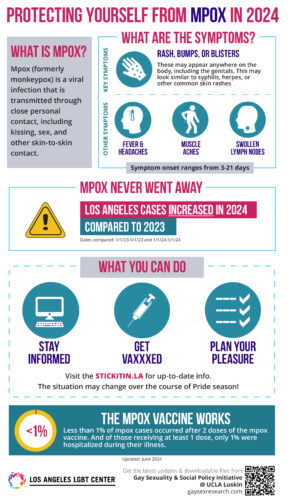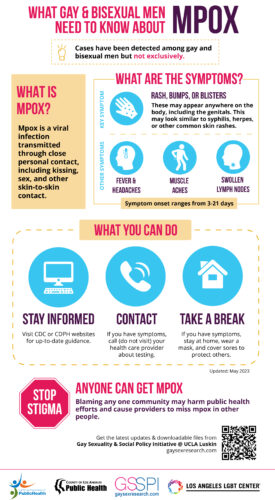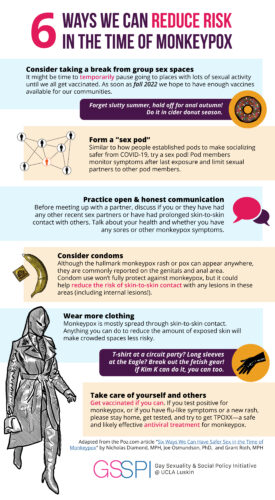Protecting Yourself From Mpox in 2024
 Mpox (formerly monkeypox) is a skin infection caused by the mpox virus, an orthopox virus related to smallpox. Mpox was discovered in humans in 1970 and long caused largely small and zoonotic outbreaks in Central and West Africa. In 2022, mpox Clade II spread globally, leading to nearly 100,000 cases and over 100 deaths, mostly in queer sexual networks. Since 2022, mpox continues to cause disease globally, although with only sporadic cases reported in most countries. Now, an increase in global Clade II infections alongside a novel outbreak of the more serious Clade I virus in Central Africa reaffirms the threat of mpox for global health security.
Mpox (formerly monkeypox) is a skin infection caused by the mpox virus, an orthopox virus related to smallpox. Mpox was discovered in humans in 1970 and long caused largely small and zoonotic outbreaks in Central and West Africa. In 2022, mpox Clade II spread globally, leading to nearly 100,000 cases and over 100 deaths, mostly in queer sexual networks. Since 2022, mpox continues to cause disease globally, although with only sporadic cases reported in most countries. Now, an increase in global Clade II infections alongside a novel outbreak of the more serious Clade I virus in Central Africa reaffirms the threat of mpox for global health security.
Download the infographic:
- Full-length infographic (one-page, 8.5×14″): English (PDF | JPEG)
- Printable (double-sided, 8.5×11″): English (PDF)
- Social media: English (Twitter/X, Facebook, Instagram)
What Gay and Bisexual Men Need to Know about Mpox (formerly known as Monkeypox)
 At GSSPI, we remain committed to conducting research to understand health issues that impact our communities and challenging stigma about gay sex and gay sexuality. We also remain committed to education and community empowerment.
At GSSPI, we remain committed to conducting research to understand health issues that impact our communities and challenging stigma about gay sex and gay sexuality. We also remain committed to education and community empowerment.
As a first step, we have developed an infographic in collaboration with our partners at the LA LGBT Center about what gay and bisexual men need to know about the ongoing mpox outbreaks. Please download, share with your networks, and stay tuned for additional resources.
These infographics were developed by and for gay and bisexual men and are being translated into many languages in order to support the work of community-based organizations serving LGBT+ communities across the globe. Please see links below to download PDF and JPG versions and social media share links.
For more in-depth information about mpox. please read the Frequently Asked Questions, which were developed in consultation with UCLA virologists, epidemiologists, and community advisors. You can find updated information on monkeypox by visiting the US Centers for Disease Control (CDC) and World Health Organization (WHO). Additional community resources are available from PrEPster.
Languages:
- English (PDF | JPG)
- Arabic (PDF | JPG), Armenian (PDF | JPG), Cambodian (PDF | JPG), Chinese, Simplified (PDF | JPG), Chinese, Traditional (PDF | JPG), German (PDF | JPG), Japanese (PDF | JPG), Korean (PDF | JPG), Farsi (PDF | JPG), French (PDF | JPG), Russian (PDF | JPG), Spanish (PDF | JPG), Tagalog (PDF | JPG), Vietnamese (PDF | JPG)
Social Media:
- English (Twitter | Facebook | Instagram), Spanish (Twitter | Facebook | Instagram), Tagalog (Twitter | Facebook | Instagram), Chinese, Simplified (Twitter | Facebook | Instagram)
6 Ways We Can Reduce Risk in the Time of Monkeypox
 Since we released our first message about the global monkeypox virus (MPV) outbreak in late May, cases have increased exponentially. The majority are among gay, bisexual, and other men who have sex with men. While MPV can infect anyone, our communities are being disproportionately impacted. Vaccines exist but are in short supply, and vaccine roll-out strategies differ by jurisdiction, which makes harm reduction messaging crucial. Together with our colleagues Nick Diamond, MPH, Joseph Osmundson, PhD, and Grant Roth, MPH we’ve put together an infographic on how to have safer sex during the MPV outbreak based on their recent article in POZ magazine. Please share this resource created by and for gay menwith your social and sexual networks.
Since we released our first message about the global monkeypox virus (MPV) outbreak in late May, cases have increased exponentially. The majority are among gay, bisexual, and other men who have sex with men. While MPV can infect anyone, our communities are being disproportionately impacted. Vaccines exist but are in short supply, and vaccine roll-out strategies differ by jurisdiction, which makes harm reduction messaging crucial. Together with our colleagues Nick Diamond, MPH, Joseph Osmundson, PhD, and Grant Roth, MPH we’ve put together an infographic on how to have safer sex during the MPV outbreak based on their recent article in POZ magazine. Please share this resource created by and for gay menwith your social and sexual networks.
GSSPI is working on several rapid-response research projects related to MPV among gay, bisexual, and other men who have sex with men. This includes tracking online homophobia and stigma in relation to MPV. We’re also committed to supporting advocacy efforts at the local, federal, and global levels to increase vaccine access. Unlike the early days of the COVID-19 pandemic, we can curb the spread of MPV. We have approved vaccines and established network of LGBTQ+ community-based organizations ready to assist with vaccination efforts. Now we need more vaccine supply. Contact your elected officials and remind them that access to vaccines for marginalized communities is a social justice issue. Our health and our lives matter.
Languages:
Social Media:
- English (Twitter in 2 images | Twitter in 1 image | Facebook | Instagram)
